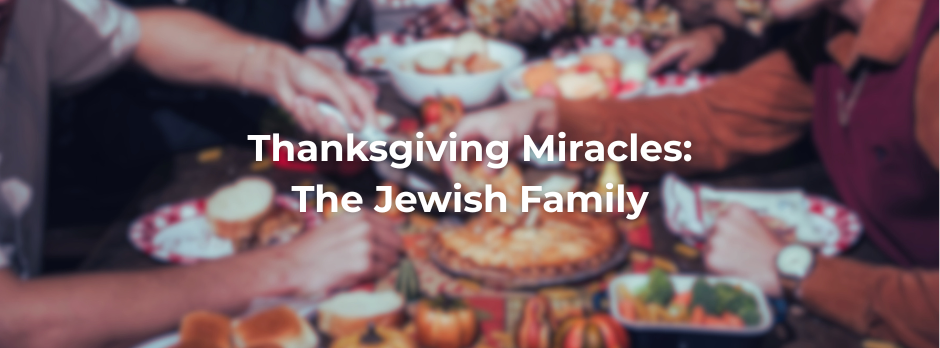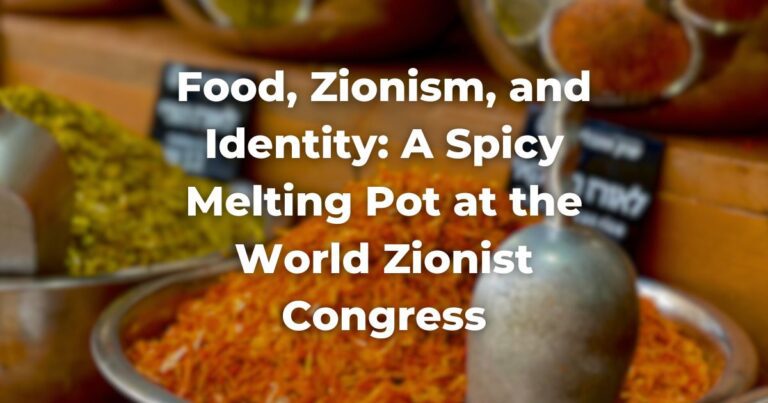If you’re stressed preparing for this Thanksgiving—with the amount of food you have to cook, cleaning for days, having to sit next to great-uncle Harvey who won’t stop talking about politics—think about doing all of this for three days in a row.
Think about everyone staying in your house. Cooking all of the food days ahead of time. Sharing a single bathroom.
On a Jewish holiday leading into Shabbat, when you can’t drive to a movie or turn on your stovetop, it might feel like everyone is on top of each other.
That can get overwhelming.
And for us, that’s kind of the point.
For most Americans, Thanksgiving is no big deal. It’s one meal. You can escape into your phone, you can slip out for a drive, and then you get to leave. The American model of family minimizes inconvenience, and it maximizes personal space. “Family” is something you do a couple times a year, and then recover from.
The Jewish vision of family is a bit different.
Judaism is a home-based religion. Every seventh day we spend Shabbat with family. Kiddush’s vision of family is expansive and interdependent:
The seventh day is a Sabbath for God; you shall not do any work—you, your son or daughter, your male or female servant, your cattle, or the stranger who is within your settlements.
The Jewish definition of family is not about blood relatives. It encompasses the whole household—even the animals!—everyone whose well-being you are directly responsible for.
Pesach, Passover, extends this idea even further. The only sacrifice required for each individual household is the sacrifice of the Paschal lamb:
“Each of them shall take a lamb to a family, a lamb to a household. If the household is too small for a lamb, let it share one with a neighbor who dwells nearby, in proportion to the number of persons: you shall contribute for the lamb according to what each household will eat” (Shemot 12:3-4).
You are required to sacrifice enough for everyone in your community to eat.
The fundamental vision of Pesach with your family—believe it or not!—is in the Haggadah, in the midrashThis word is used in two ways, as both a concept and a literature. As a concept, midrash is the expansive interpretation of biblical texts. The term is used to describe the practice of rabbinic interpretation. As a text, it refers to specific collections of interpretations, particularly from the third to ninth centuries in the Land of Israel and Babylonia. Plural: Midrashim
Read more of the Four Children (wise, wicked, simple, and one who does not know how to ask). The TalmudReferring to one of two collections, the Jerusalem and Babylonian Talmuds, edited in the 6th century, that contains hundreds of years of commentary, discussion, and exploration of the ideas in the Mishnah. One could describe it as Mishnah + Gemara = Talmud Read more Yerushalmi explains why the wicked child is, in fact, wicked. The wicked child asks, “What’s the point of all this work that you are doing for us every year?” By doing so, they “separate themselves from the community.”
The labor we do for our families on our holidays is how we make our family a community.
Thanksgiving takes a lot of work—and that’s what makes it special.
To the simple child, the Yerushalmi says, we teach one Law:
One may not follow the Pesach [sacrifice] with the Afikoman.
We usually think of Afikoman as the last thing we are allowed to eat at the seder. But the Yerushalmi gives a different explanation, using an Aramaic pun:
Afiko—take out
Man—dish
Put together, we get, “One may not follow the Pesach [sacrifice] with taking the dishes somewhere else”! The Talmud understands this to mean, “You can’t leave one group to join another group.”
Once you’ve made the investment, you have to stick with the family you’ve built as your community.
Judaism wants us to experience some amount of discomfort—the discomfort of hard work, and of sticking it out when it gets difficult (not, of course, dangerous). Those commitments are what makes our connections the strongest.
That means you can’t just get away when things get a little tough. That means everyone’s talking all at once, you’re hearing everyone’s opinions, and it might not look, from the outside, like respect. Unlike Thanksgiving, we don’t get to curate the experience. But that is a form of respect: being open and honest and giving each other our full selves, all the time; spending three days in a row in the same space, in our pajamas, without our phones or other forms of escapism. Trusting each other to fundamentally commit to us—even if it feels a little messy in the middle.
So when great-uncle Harvey is taking up the bathroom for a full hour after dinner, just remember that the truly righteous suffer from digestive ailments in this world so they will not have any suffering left in the world to come (BT Shabbat 118b/Ketubot 103b; Genesis Rabbah 62). It’s a rare gift to be able to commit to each other the way Judaism demonstrates, to look for the best in each other, and to be fully present. This Thanksgiving, lean into the slow miracle of staying put.
Author
-

Nadav Elovitz has been involved in Jewish communities and TorahRefers to the first five books of the Hebrew Bible, the Tanakh, also called the Five Books of Moses, Pentateuch or the Hebrew equivalent, Humash. This is also called the Written Torah. The term may also refer to teachings that expound on Jewish tradition. Read more learning throughout his life. He has been a gabbai in the past but has never had any official credentials, though he is interested in a wide variety of topics related to Torah and the Jewish tradition. He is from the Boston area and works as an engineer by day.
View all posts




